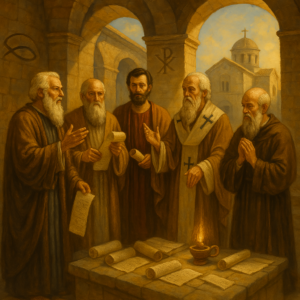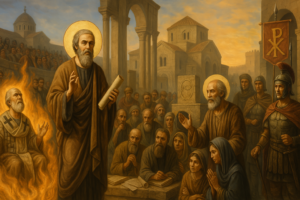Estimated reading time: 10 minutes
Key Takeaways
- The early church fathers laid the foundation for Christian doctrine and practice.
- Their teachings offer valuable insights for modern faith challenges.
- Understanding their writings can deepen one’s spiritual journey.
- They emphasized unity, reasoned faith, defending truth, and spiritual formation.
- Their examples inspire steadfastness and commitment to core beliefs.
The early church fathers were influential Christian leaders, theologians, and writers who shaped the foundation of Christian faith in the centuries following Jesus and the apostles. These venerable figures, who lived approximately from the late 1st to mid-8th centuries, created the intellectual and doctrinal framework that continues to guide Christians today.
Their writings tackled the most challenging questions of faith, defended Christian beliefs against critics, and helped establish the core doctrines many denominations still embrace. By studying these ancient voices, modern believers gain valuable insights into the roots of their faith.
This post explores seven powerful lessons from these early Christian leaders that remain remarkably relevant for today’s spiritual journey. Their ancient wisdom continues to offer fresh perspective for contemporary faith challenges.
Who Were the Early Church Fathers?
The term “early church fathers” refers to influential Christian theologians, bishops, and writers who lived during the formative period of Christianity. These learned leaders emerged after the apostolic age and helped shape Christian thought through their writings, teachings, and leadership.
These pioneering thinkers can be categorized into three main groups:
- Apostolic Fathers (late 1st to early 2nd century): Those who had direct contact with the apostles or their immediate disciples
- Ante-Nicene Fathers (2nd to early 4th century): Leaders before the Council of Nicaea in 325 AD
- Post-Nicene Fathers (4th to 8th century): Influential figures after the Council of Nicaea
Key figures include Clement of Rome (c. 35-99 AD), Ignatius of Antioch (c. 35-110 AD), Justin Martyr (c. 100-165 AD), Irenaeus of Lyons (c. 130-202 AD), and Augustine of Hippo (354-430 AD). These ancient Christian leaders wrote extensively on scripture, defended orthodox beliefs, and helped the early church navigate complex theological and practical challenges.
Insight 1: Unity in Essential Beliefs – Ignatius of Antioch
Saint Ignatius of Antioch, believed to be a disciple of the Apostle John, emphasized Christian unity as a central theme in his writings. As the third bishop of Antioch, Ignatius wrote seven authentic letters while being transported to Rome for execution around 110 AD.
Ignatius consistently stressed that church unity was essential to Christian identity. He wrote: “Be careful to observe a single Eucharist; for there is one flesh of our Lord Jesus Christ, and one cup to unite us with His blood, and one altar, just as there is one bishop.” This powerful message reminds modern believers that despite denominational differences, the core elements of faith should bring Christians together.
His letters also reveal his strong belief in the real presence of Christ in the Eucharist and the importance of proper church hierarchy. For Ignatius, unity was not just organizational but deeply spiritual – a reflection of Christ’s unity with the Father.
Today’s church can learn from Ignatius that:
- Unity doesn’t mean uniformity but agreement on essential doctrines
- Church leadership exists to preserve harmony and truth
- Divisiveness undermines the witness of Christian communities
Ignatius ultimately gave his life for his faith, demonstrating that conviction about Christian truth was worth the ultimate sacrifice.
Insight 2: Reasoned Faith – Justin Martyr
St. Justin Martyr stands as one of Christianity’s earliest and most important apologists – defenders of the faith against critics. Born around 100 AD in Samaria, Justin was a philosopher who converted to Christianity after encountering its teachings and witnessing the courage of Christian martyrs.
What makes Justin’s contribution remarkable is how he bridged philosophy and faith. Unlike some religious figures who rejected secular learning, Justin argued that the “seeds of truth” could be found in Greek philosophy, though Christianity represented the fullness of truth. This approach helped educated pagans see Christianity as intellectually credible.
Justin wrote two major Apologies (defenses) addressed to Roman emperors and his “Dialogue with Trypho,” a conversation with a Jewish scholar. In these writings, he:
- Explained Christian beliefs and practices to correct misunderstandings
- Demonstrated the fulfillment of Old Testament prophecies in Jesus
- Provided valuable descriptions of early Christian worship, including baptism and communion
- Defended Christians against false accusations of atheism and immorality
His approach teaches modern believers the importance of:
- Engaging thoughtfully with the culture rather than retreating from it
- Finding common ground with those holding different worldviews
- Addressing misconceptions about Christianity with clarity and reason
- Demonstrating how faith and intellect work together
Justin eventually died for his faith around 165 AD, showing that his defense of Christianity went beyond intellectual arguments to personal conviction.
Insight 3: Defending Truth – Irenaeus Against Heresies
Irenaeus of Lyons (c. 130-202 AD) emerged as Christianity’s first systematic theologian and a powerful defender of orthodox belief against early heresies. As bishop of Lyons in Gaul (modern-day France), Irenaeus wrote his most influential work, “Against Heresies,” to counter Gnosticism – a belief system that claimed salvation came through secret knowledge rather than faith in Christ.
Irenaeus’ approach to defending truth provides crucial insights for today’s believers:
Clear Articulation of Core Beliefs
Irenaeus didn’t just attack false teaching; he carefully articulated what Christians should believe. He developed the concept of a “rule of faith” – a summary of essential Christian doctrines handed down from the apostles. This approach reminds modern Christians to focus on clearly understanding core beliefs rather than merely reacting to contrary ideas.
Emphasis on Apostolic Succession
To counter claims of secret knowledge, Irenaeus traced church teaching back to the apostles through an unbroken line of bishops. He wrote, “It is possible for everyone in every church who may wish to know the truth to contemplate the tradition of the apostles manifested throughout the whole world.” This standard of continuity with apostolic teaching remains a valuable test of doctrinal claims.
Focus on Scripture’s Unity
Irenaeus insisted that the Old and New Testaments tell one unified story of God’s redemptive work. Against Gnostics who rejected the Old Testament, he demonstrated how Jesus fulfilled God’s promises throughout scripture. His approach teaches today’s believers to read the Bible as a coherent whole rather than isolated portions.
Recognition of Reason’s Limits
While valuing reason, Irenaeus recognized its limitations in understanding God. He wrote that we should be content to know “that God has created all things…but as to the manner and cause of the creation of each, we must leave such knowledge to God.” This balanced approach reminds us that mystery has a proper place in faith.
Irenaeus’ teachings help modern believers distinguish between essential doctrine and peripheral issues, providing a model for maintaining orthodoxy without becoming rigid or reactionary.
Insight 4: Faithful Witness – Polycarp of Smyrna
Polycarp of Smyrna (c. 69-155 AD) provides one of the most powerful examples of faithful Christian witness under persecution. As a direct disciple of the Apostle John and bishop of Smyrna, Polycarp represents a living link between the apostolic age and the second-century church.
Polycarp’s primary contribution comes through his steadfast commitment to apostolic teaching and his courageous martyrdom. His letter to the Philippians demonstrates his deep knowledge of scripture and commitment to practical Christian living. He emphasizes:
- Living righteously in anticipation of Christ’s return
- Avoiding the “love of money” and practicing contentment
- Supporting church leaders who teach sound doctrine
- Praying for government authorities, even those who persecuted Christians
However, it’s the account of Polycarp’s martyrdom that provides the most inspiring lesson for modern faith. When brought before the Roman authorities at age 86 and ordered to renounce Christ, Polycarp famously replied:
“Eighty-six years I have served Him, and He has done me no wrong. How can I blaspheme my King who saved me?”
Despite threats of wild beasts and fire, Polycarp remained unwavering, eventually being burned at the stake while praying for his executioners.
This account teaches believers today that:
- Faith should deepen and strengthen over a lifetime
- Genuine conviction is revealed during times of testing
- Christian witness includes both teaching and personal example
- Loyalty to Christ supersedes personal safety and comfort
Polycarp’s witness reminds modern Christians that faithfulness may sometimes require significant sacrifice, but such steadfastness makes a powerful impression on observers.
Insight 5: Biblical Interpretation – Origen and Tertullian
Two early church fathers, Origen of Alexandria (c. 185-254 AD) and Tertullian of Carthage (c. 155-220 AD), developed influential approaches to Scripture that continue to shape how Christians understand and apply the Bible today.
Origen’s Contemplative Approach
Origen, a prolific scholar who wrote over 2,000 treatises, pioneered systematic biblical interpretation. His approach included:
- Multiple layers of meaning: Origen saw three levels in Scripture – literal, moral, and spiritual – suggesting that deeper truths lay beyond the surface text
- Typology: He identified people and events in the Old Testament as “types” or foreshadowings of Christ and New Testament realities
- Rigorous study: Despite his spiritual reading, Origen insisted on careful textual analysis and learning biblical languages
While some of Origen’s speculative interpretations were later rejected, his emphasis on seeking Christ throughout Scripture and his systematic approach to biblical study remain valuable contributions.
Tertullian’s Practical Focus
Tertullian, the son of a Roman centurion and trained in law, brought a different perspective to Scripture. His approach included:
- Clear application: Tertullian focused on how biblical principles should shape Christian conduct
- Theological precision: He coined many terms still used in Christian theology including “Trinity” and “person” as applied to the Godhead
- Apologetic use: He employed Scripture effectively to defend Christian beliefs against critics
Tertullian’s practical approach reminds believers that Scripture should transform daily life, not just inform intellectual understanding.
Together, these church fathers teach modern Christians to:
- Approach Scripture with both academic rigor and spiritual sensitivity
- Look for Christ throughout the Bible, not just in the New Testament
- Allow biblical truth to shape both thought and conduct
- Use Scripture thoughtfully when defending faith to skeptics
Their complementary approaches remind us that biblical interpretation requires both careful study and spiritual discernment, intellectual precision and practical application.
Insight 6: Formative Christian Doctrine – The Nicene Creed
The formation of Christian doctrine reached a pivotal moment at the Council of Nicaea in 325 AD, which produced the Nicene Creed – a statement of faith still recited by millions of Christians worldwide. This council and its creed demonstrate how the early church fathers worked collectively to articulate essential Christian beliefs.
The Historical Context
Emperor Constantine called the Council of Nicaea to address a theological controversy sparked by Arius, who taught that Jesus was created by God and therefore not fully divine. This view threatened the core Christian understanding of salvation and God’s nature.
Over 300 bishops gathered to address this issue, including influential fathers like Athanasius of Alexandria, who championed the orthodox position that Jesus is “of the same substance” (homoousios) as the Father – fully God, not a lesser created being.
The Creed’s Significance
The Nicene Creed’s careful wording about Christ’s nature – “begotten, not made, of one Being with the Father” – established a theological benchmark that:
- Preserved the biblical witness to Christ’s divinity
- Protected the Christian understanding of salvation (only God could save humanity)
- Created unity around essential doctrine while allowing diversity in secondary matters
- Demonstrated how Scripture guides doctrinal development
The council didn’t invent new beliefs but formally articulated what had been taught since apostolic times, showing how Christian doctrine develops through careful reflection on Scripture and tradition.
Lessons for Today
The Nicene Creed and the process that created it teach modern Christians several important lessons:
- Doctrine matters: Theological precision isn’t mere wordplay but affects how we understand God, salvation, and Christian living
- Unity requires clarity: True Christian unity comes through agreement on essential beliefs, not by avoiding difficult theological questions
- Communal discernment: Major doctrinal decisions should involve the broader church community, not just individual interpretation
- Scriptural fidelity: Even when developing new terminology, doctrine must remain faithful to biblical teaching
The creed reminds believers that Christianity has always been a faith with specific content, not just subjective experience or moral teaching.
Insight 7: Spiritual Formation – Augustine of Hippo
Augustine of Hippo (354-430 AD), perhaps the most influential of all church fathers, offers profound insights into spiritual formation through his writings, particularly his autobiographical work “Confessions.” His journey from restless seeker to devoted believer continues to resonate with Christians navigating their own spiritual paths.
Personal Transformation
Augustine’s “Confessions” traces his spiritual journey from a pleasure-seeking youth to a committed Christian bishop. His famous prayer, “You have made us for yourself, O Lord, and our hearts are restless until they rest in you,” captures his discovery that true fulfillment comes only through relationship with God.
Key aspects of Augustine’s spiritual formation include:
- Intellectual wrestling: Augustine explored various philosophies before embracing Christianity, showing that faith can withstand rigorous questioning
- Moral struggle: His honest account of battling sexual temptation (“Give me chastity and continence, but not yet”) resonates with anyone facing persistent temptations
- Decisive moment: Augustine’s garden conversion after hearing “Take up and read” demonstrates how Scripture can catalyze transformation
- Ongoing growth: Even after conversion, Augustine continued deepening his understanding and practice of faith
Practical Spiritual Guidance
Beyond his personal story, Augustine offers practical wisdom for spiritual development:
- Prayer as conversation: Augustine’s writings depict prayer as intimate dialogue with God rather than formal ritual
- Scripture as nourishment: He likens the Bible to food that sustains the soul, encouraging deep engagement with God’s word
- Community as essential: Augustine founded monastic communities, recognizing that spiritual growth happens best in relationship with others
- Grace as foundation: His emphasis on God’s grace countering human sinfulness reminds believers that spiritual growth comes through divine help, not mere self-effort
Relevance Today
Augustine’s approach to spiritual formation speaks powerfully to contemporary believers by:
- Validating the reality of struggle in the Christian life
- Encouraging intellectual engagement rather than blind faith
- Balancing individual spiritual disciplines with communal practice
- Focusing on heart transformation rather than mere behavior modification
- Emphasizing grace while still calling for human response
His integrated vision of spiritual formation – involving mind, heart, will, and community – offers an antidote to fragmented approaches to faith that separate belief from practice, individual from community, or grace from responsibility.
Conclusion: Enduring Influence of Early Church Fathers
The early church fathers have left an indelible mark on Christianity that continues to shape faith and practice today. Their collective wisdom offers a rich heritage that transcends denominational boundaries and speaks to contemporary spiritual needs.
These seven insights demonstrate the remarkable relevance of these ancient teachers:
- Unity in Essential Beliefs: Ignatius of Antioch reminds us that core doctrines should unite rather than divide believers.
- Reasoned Faith: Justin Martyr shows how faith and intellect work together in developing and defending Christian beliefs.
- Defending Truth: Irenaeus provides a model for addressing false teachings while maintaining a positive articulation of orthodox faith.
- Faithful Witness: Polycarp exemplifies unwavering commitment to Christ even when facing extreme persecution.
- Biblical Interpretation: Origen and Tertullian offer complementary approaches to Scripture that balance depth and practicality.
- Formative Christian Doctrine: The creation of the Nicene Creed demonstrates the careful process of articulating essential Christian beliefs.
- Spiritual Formation: Augustine’s journey illustrates how intellectual understanding, moral struggle, and divine grace work together in spiritual growth.
As modern Christians face challenges both similar to and different from those of the early church, these fathers offer proven wisdom that has stood the test of time. Their writings remind us that Christianity has always been a thinking faith that addresses life’s deepest questions while calling believers to transformed lives.
By engaging with these historical voices, today’s Christians can find their faith deepened, their understanding broadened, and their spiritual practices enriched. The early church fathers do not replace Scripture but help us read it more faithfully within the great tradition of Christian thought.
Additional Resources
For those interested in exploring the early church fathers further, several excellent online resources are available:
- Christian Classics Ethereal Library (www.ccel.org): Offers free access to many writings of the church fathers along with helpful introductions.
- Early Christian Writings (www.earlychristianwritings.com): Provides texts and scholarly commentary on documents from the first two centuries.
- The Catholic Encyclopedia (www.newadvent.org/fathers): Features an extensive collection of patristic writings organized by author.
- Ancient Christian Writers Series: A print collection offering modern translations with helpful notes and introductions.
- The Apostolic Fathers in English by Michael W. Holmes: A reliable translation of the earliest post-biblical Christian writings.
For beginners, consider starting with shorter works like Polycarp’s Letter to the Philippians, The Didache, or selections from Augustine’s Confessions. These accessible texts provide an excellent introduction to the thought and spirit of the early church.
Remember that these ancient voices are best understood within their historical context while remaining open to how their timeless insights might speak to contemporary circumstances.
Frequently Asked Questions
Why should modern Christians study the early church fathers?
Studying the early church fathers helps modern Christians understand the origins of their beliefs and practices. These leaders grappled with foundational theological issues, and their writings provide insight into how core doctrines were formed. Engaging with their works can deepen one’s faith and provide guidance on contemporary issues.
Are the teachings of the early church fathers relevant today?
Absolutely. While some cultural contexts have changed, the core spiritual and theological insights of the early church fathers remain applicable. Their emphasis on unity, reasoned faith, and spiritual formation addresses challenges that Christians continue to face in the modern world.
Do I need special training to read the works of the early church fathers?
No special training is required, though some background knowledge can enhance understanding. Many translations include introductions and notes that provide context. Starting with more accessible texts and gradually exploring deeper theological works is a good approach.
How did the early church fathers influence the development of Christian doctrine?
The early church fathers played a crucial role in articulating and defending core Christian doctrines. Through councils like Nicaea and writings that addressed heresies, they clarified beliefs about the nature of Christ, the Trinity, salvation, and more. Their efforts established a foundation that has endured throughout church history.
Are the teachings of the early church fathers accepted by all Christian denominations?
While interpretations may vary, many Christian denominations respect the contributions of the early church fathers. Their works are often considered valuable for understanding historical theology and are used across various traditions for education and spiritual formation.




